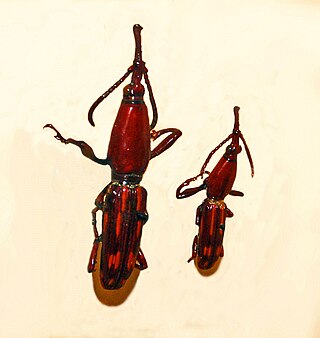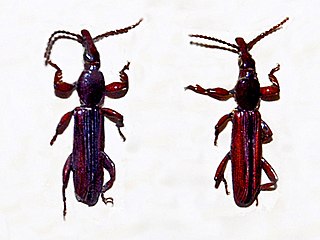
Weevils are beetles belonging to the superfamily Curculionoidea, known for their elongated snouts. They are usually small – less than 6 mm in length – and herbivorous. Approximately 97,000 species of weevils are known. They belong to several families, with most of them in the family Curculionidae. It also includes bark beetles, which while morphologically dissimilar to other weevils in lacking the distinctive snout, is a subfamily of Curculionidae. Some other beetles, although not closely related, bear the name "weevil", such as the biscuit weevil, which belongs to the family Ptinidae.
Caridae is a small Gondwanan family of weevils. They are considered part of the primitive weevil group, because they have straight rather than geniculate (elbowed) antennae. The insertion of the antennae on the rostrum cannot be seen from above. Caridae also lack spiracles on abdominal tergites 6 and 7. The prothorax lacks lateral carinae. It has been suggested that the fossil weevil Eccoptarthrus belongs in this family, which would result in a change in the family name ; this proposal has been rejected by most coleopterists (e.g.)

Brentidae, sometimes known as the primitive weevils, is a cosmopolitan family of primarily xylophagous beetles also known as straight-snouted weevils. The concept of this family has been expanded with the inclusion of three groups formerly placed in the Curculionidae; the subfamilies Apioninae, Cyladinae, and Nanophyinae, as well as the Ithycerinae, previously considered a separate family. They are most diverse in the tropics, but occur throughout the temperate regions of the world. They are among the families of weevils that have non-elbowed antennae, and tend to be elongate and flattened, though there are numerous exceptions.

Orychodes digramma is a species of Brentidae family. It occurs in Papua New Guinea. It was first described in 1835 by Jean Baptiste Boisduval within Arrhenodes. it is currently accepted under the genus Orychodes.

Ithystenus is a genus of straight-snouted weevils belonging to the family Brentidae. Species of this genus can be found in Papua New Guinea

Cerobates is a genus of beetles belonging to the family Brentidae.

Rhinorhynchus is a weevil genus.

Apion cruentatum is a species of beetle in the family Brentidae. It is found in the Palearctic.

Omphalapion is a genus of pear-shaped weevils in the family of beetles known as Brentidae. There are about five described species in Omphalapion.

Cyladinae is a subfamily of sweet potato weevils in the family of beetles known as Brentidae. There are two genera in Cyladinae, Cylas Latreille 1802, and the extinct genus Miocenocylas Legalov 2018.
Heterobrenthus is a genus of primitive weevils in the beetle family Brentidae. There are at least three described species in Heterobrenthus.
Stereodermus exilis is a species of primitive weevil in the beetle family Brentidae. It is found in the Caribbean Sea and North America.
Stereodermus is a genus of primitive weevils in the beetle family Brentidae. There are more than 40 described species in Stereodermus.

Trichapion is a genus of weevil in the family Brentidae.
Nanophyes is a genus of beetles belonging to the family Brentidae.

Apion is a genus of beetles belonging to the family Brentidae. The genus was first described in 1797 by Johann Friedrich Wilhelm Herbst.
Apionion is a genus of beetles belonging to the family Brentidae.
Nemocephalus is a genus of beetles belonging to the family Brentidae.

Arrenodes is a genus of beetles belonging to the family Brentidae.

Orychodes is a genus of beetle in the Brentidae family.











